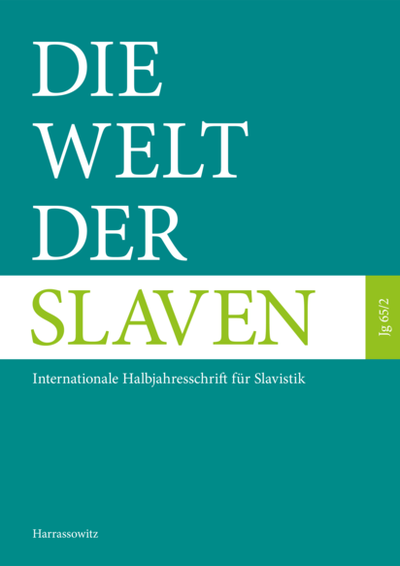Agent prominence and movement in Russian third person plural impersonals (“indefinite-personal sentences”)
DOI:
https://doi.org/10.13173/WS.65.2.297Schlagwörter:
agentivity, linguistic prominence, verbs of motion, volition, sentienceAbstract
The present paper reports the results of an acceptability judgement test designed to test two hypotheses: first, that the Russian 3pl impersonal construction is affected by agent prominence, i.e. verbs implying a more prominent agent are more acceptable than verbs implying an agent with fewer agentivity features; second, that movement as an agentivity feature should be conceptualized as a gradual category, thus making a fast-moving referent a more prominent agent than one moving slowly. The former hypothesis could be verified, the latter falsified.
Literaturhinweise
Berger, Tilman. 1991. Zum denotativen Status „unbestimmt-persönlicher“ Konstruktionen im Tschechischen. In Grochowski, Maciej & Weiss, Daniel (eds.). “Words are physicians for an ailing mind”: Ὀργῆς νοσούσης εἰσὶν ἰατροὶ λόγοι, 71–81. München.
Bizzarri, Camilla. 2015. Russian as a partial pro-drop language: Data and analysis from a new study. Annali di Ca’ Foscari: Serie occidentale 49. 335–362.
Bulygina, Tatʹjana V. & Šmelev, Aleksej D. 1997. Jazykovaja konceptualizacija mira (na materiale russkoj grammatiki). Moskva.
Bunčić, Daniel. 2008. Die (Re )Nationalisierung der serbokroatischen Standards. In Kempgen, Sebastian & Gutschmidt, Karl & Jekutsch, Ulrike & Udolph, Ludger (eds.), Deutsche Beiträge zum 14. Internationalen Slavistenkongress, Ohrid 2008, 89–102. München.
Bunčić, Daniel. 2018. Impersonal constructions in Slavic languages and the agentivity of the verb. In Kempgen, Sebastian & Wingender, Monika & Franz, Norbert (eds.), Deutsche Beiträge zum 16. Internationalen Slavistenkongress, Belgrad 2018, 101–110. Wiesbaden.
Bunčić, Daniel. 2019. Agent prominence in the Polish -no/-to construction. In Bauer, Anastasia & Bunčić, Daniel (eds.), Linguistische Beiträge zur Slavistik: XXIV. JungslavistInnen-Treffen in Köln, 17.–19. September 2015, 63–76. Frankfurt am Main.
Cabredo Hofherr, Patricia. 2006. ‘Arbitrary’ pro and the theory of pro-drop. In Ackema, Peter & Brandt, Patrick & Schoorlemmer, Maaike & Weerman, Fred, Arguments and agreement, 230–258. Oxford.
Crocker, Matthew W. & Brants, Thorsten. 2000. Wide-coverage probabilistic sentence processing. Journal of Psycholinguistic Research 29(6). 647–669.
Dowty, David. 1991. Thematic proto-roles and argument selection. Language 67(3). 547–619.
Gast, Volker & van der Auwera, Johan. 2013. Towards a distributional typology of human impersonal pronouns, based on data from European languages. In Bakker, Dik et al. (eds.), Languages across boundaries: Studies in memory of Anna Siewierska, 119–158. Berlin.
Himmelmann, Nikolaus & Primus, Beatrice. 2015. Prominence beyond prosody – a first approximation. In De Domenicis, Amadeo (ed.), pS-prominenceS: Prominences in Linguistics, Proceedings of the international conference, Viterbo, Italy, 12–14 December 2013, 38–58. Viterbo.
hrWaC = Croatian Web Corpus v2.2 (2014). In No Sketch Engine. https://www.clarin.si/noske/all.cgi/first_form?corpname=hrwac.
Kibort, Anna. 2004. Passive and passive-like constructions in English and Polish. Cambridge. (PhD dissertation.)
Kretzschmar, Franziska & Graf, Tim & Philipp, Markus & Primus, Beatrice. 2019. An experimental investigation of agent prototypicality and agent prominence in German. In Gattnar, Anja & Hörnig, Robin & Störzer, Melanie & Featherston, Sam (eds.), Proceedings of Linguistic Evidence 2018: Experimental data drives linguistic theory. http://dx.doi.org/10.15496/publikation 32628.
Kudrnáčová, Naděžda. 2008. Directed motion at the syntax-semantics interface. Brno.
Lindseth, Martina. 1998. Null-subject properties of Slavic languages: With special reference to Russian, Czech and Sorbian. München.
MacDonald, Maryellen Coles & Pearlmutter, Neal J. & Seidenberg, Mark S. 1994. The lexical nature of syntactic ambiguity resolution. Psychological Review 101. 676–703.
Malamud, Sophia A. 2013. (In)definiteness-driven typology of arbitrary items. Lingua 126. 1–31.
Malchukov, Andrej & Ogawa, Akio. 2011. Towards a typology of impersonal constructions: A semantic map approach. In Malchukov, Andrej & Siewierska, Anna (eds.), Impersonal constructions: A cross-linguistic perspective, 19–56. Amsterdam.
McShane, Marjorie. 2009. Subject ellipsis in Russian and Polish. Studia Linguistica 63(1). 98–132.
Melʹčuk, Igorʹ A. 1995. Russkij jazyk v modeli «Smysl ⇔ tekst» / The Russian language in the Meaning—Text perspective. Moskva.
Nikitina, Elena N. 2011. Neopredelënno-ličnye predloženija. In Plungjan, Vladimir A. (ed.), Russkaja korpusnaja grammatika. http://rusgram.ru/Неопределенно-личные_предложения.
NKRJa = Nacionalʹnyj korpus russkogo jazyka. http://ruscorpora.ru/.
Padučeva, Elena V. 2012. Neopredelenno-ličnoe predloženie i ego podrazumevaemyj subʺekt. Voprosy jazykoznanija 2012(1). 27–41.
Philipp, Markus & Graf, Tim & Kretzschmar, Franziska & Primus, Beatrice. 2017. Beyond verb meaning: Experimental evidence for incremental processing of semantic roles and event structure. Frontiers in Psychology 8:1806. 1–16.
Plungjan, Vladimir A. 2011. Vvedenie v grammatičeskuju semantiku: Grammatičeskie značenija i grammatičeskie sistemy jazykov mira. Moskva.
Prenner, Maria Katarzyna. 2019. Agentivität in menschlich-unpersönlichen Konstruktionen im Polnischen. Linguistische Treffen in Wrocław 15. 341–350. http://dx.doi.org/10.23817/lingtreff.15 29.
Primus, Beatrice. 2011. Animacy and telicity: Semantic constraints on impersonal passives. Lingua 121(1). 80–99.
Siewierska, Anna. 2008. Introduction: Impersonalization from a subject-centred vs. agent-centred perspective. Transactions of the Philological Society 106 (2). 115–137.
Siewierska, Anna & Papastathi, Maria. 2011. Towards a typology of third person plural impersonals. Linguistics 49(3). 575–610.
Švedova, Natalija Ju. (ed.). 1980. Russkaja grammatika. 2 vols. Moskva.
Tilburg, José van. 1986. South Slavic accusative objects accompanying ‘reflexive’ se. Zbornik Matice srpske za filologiju i lingvistiku 29(1). 91–101.
Vinogradov, Viktor V. 1954. Grammatika russkogo jazyka. Tom 2, častʹ 2. Moskva.

